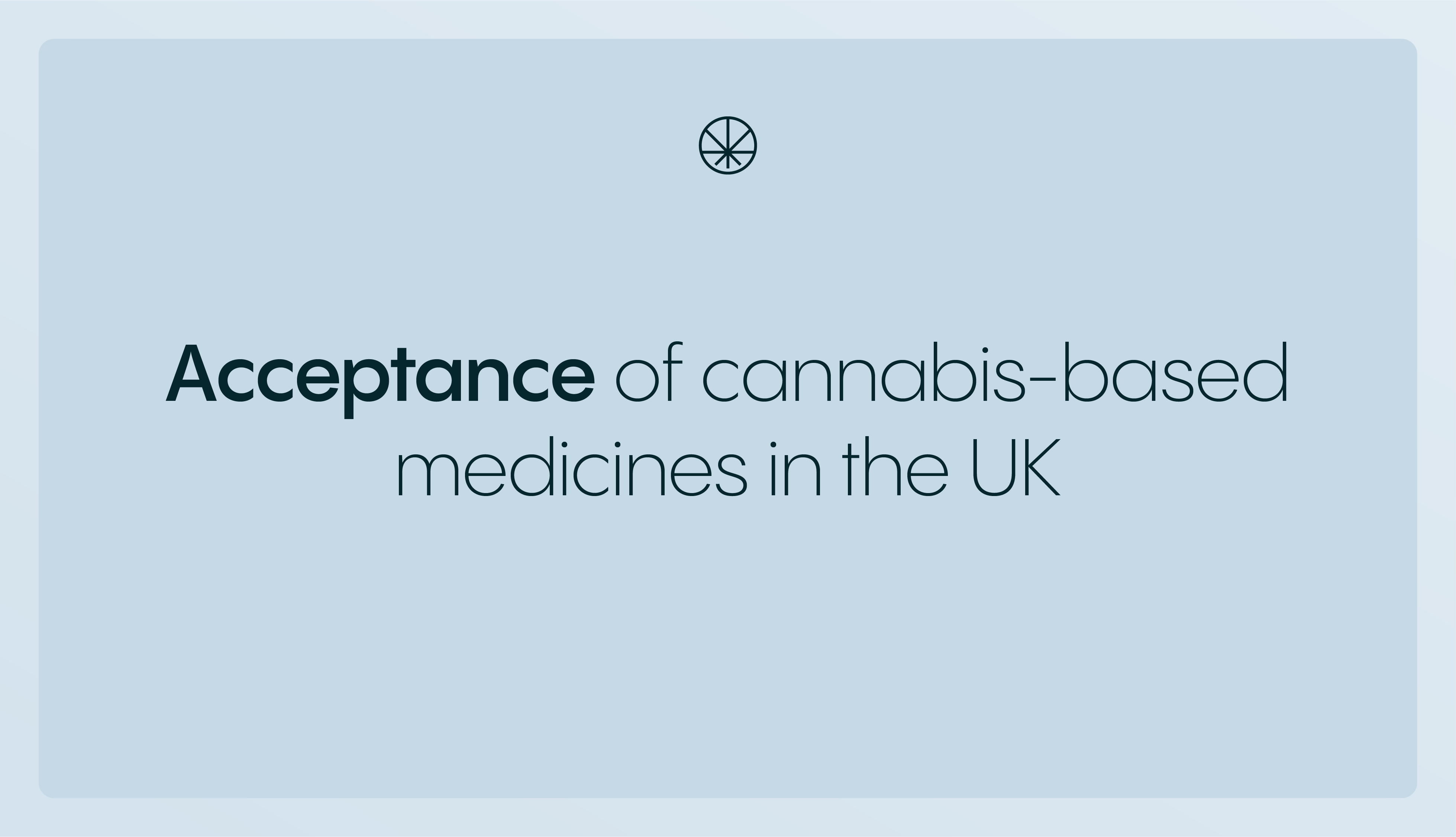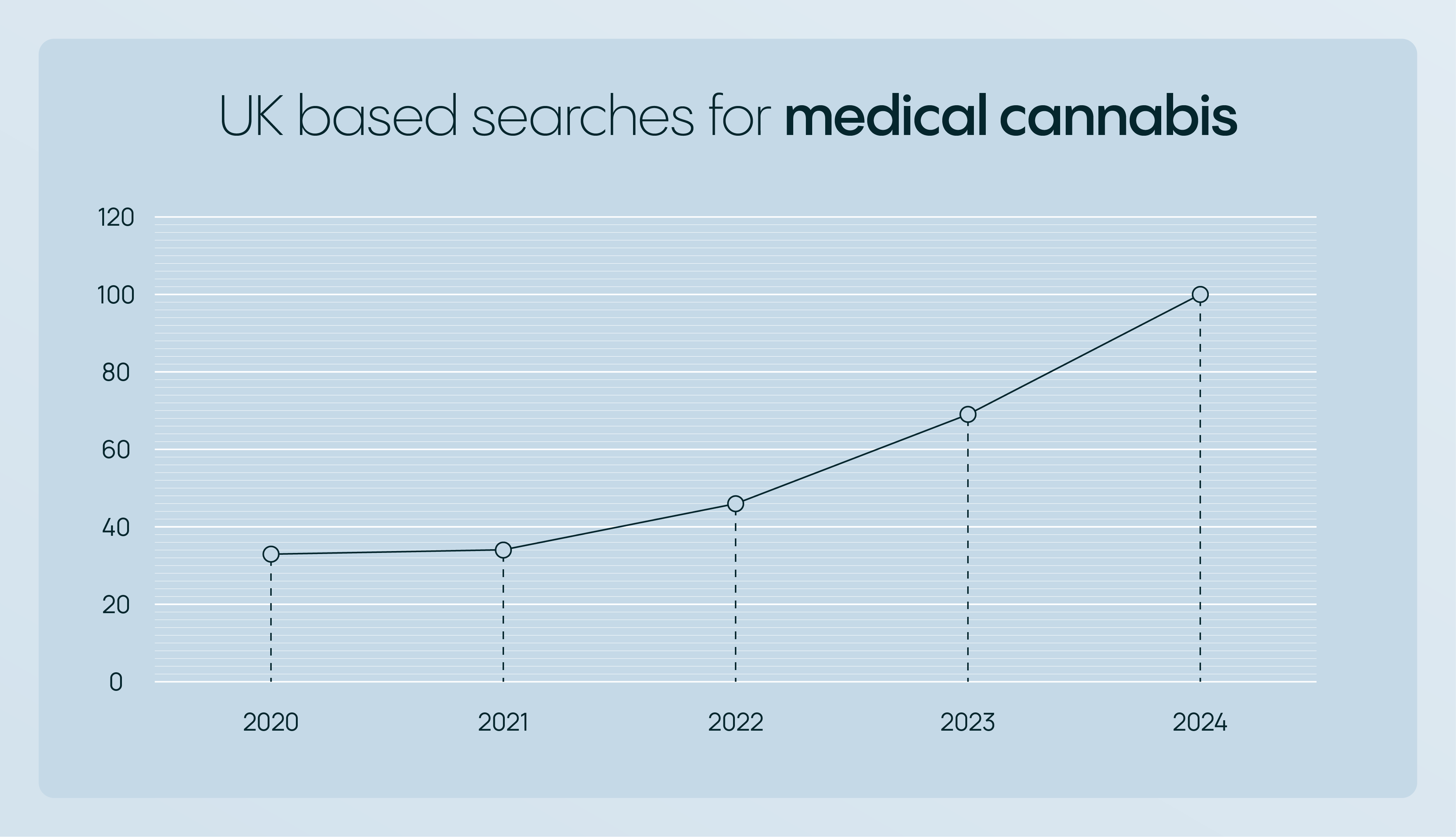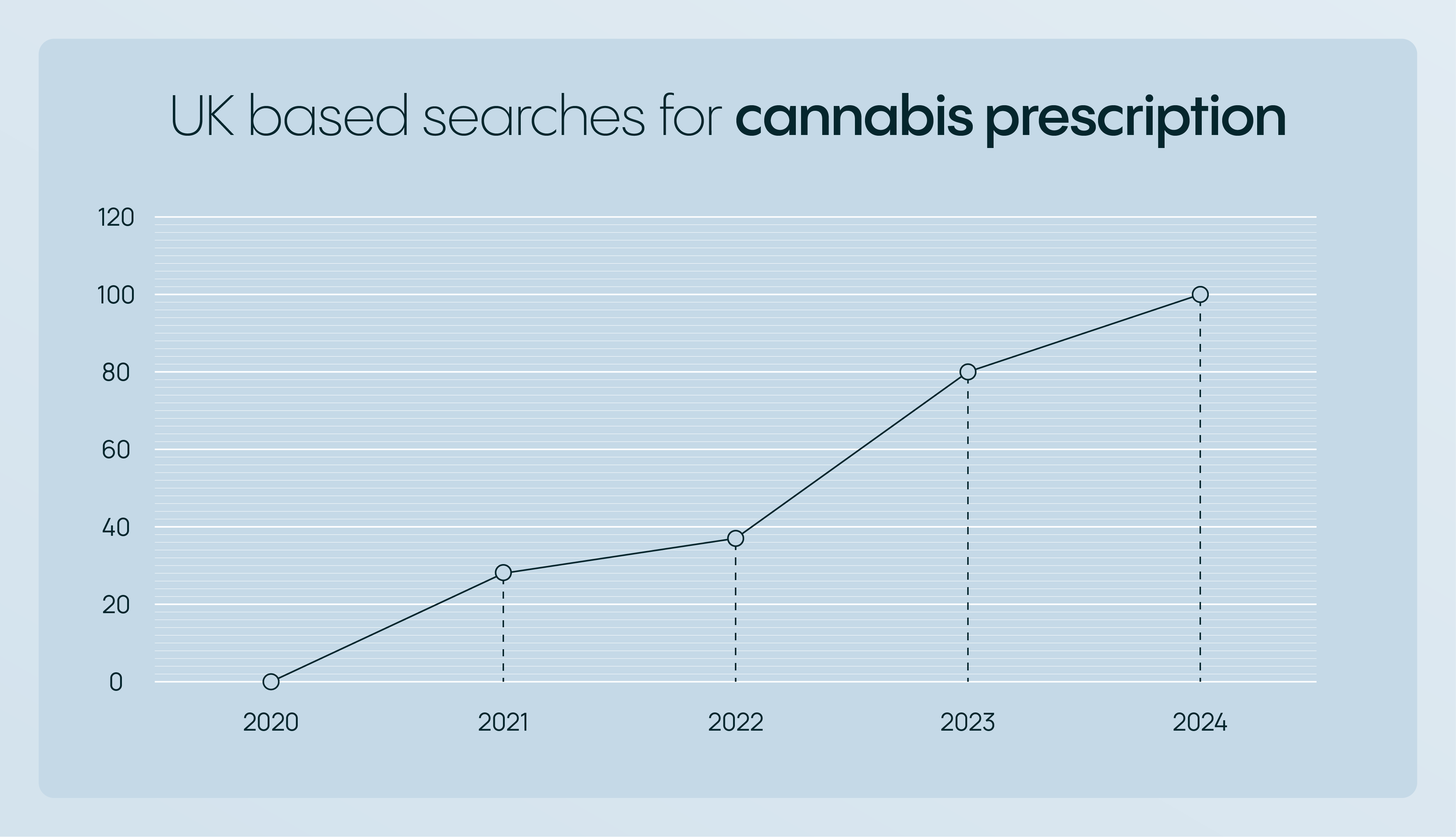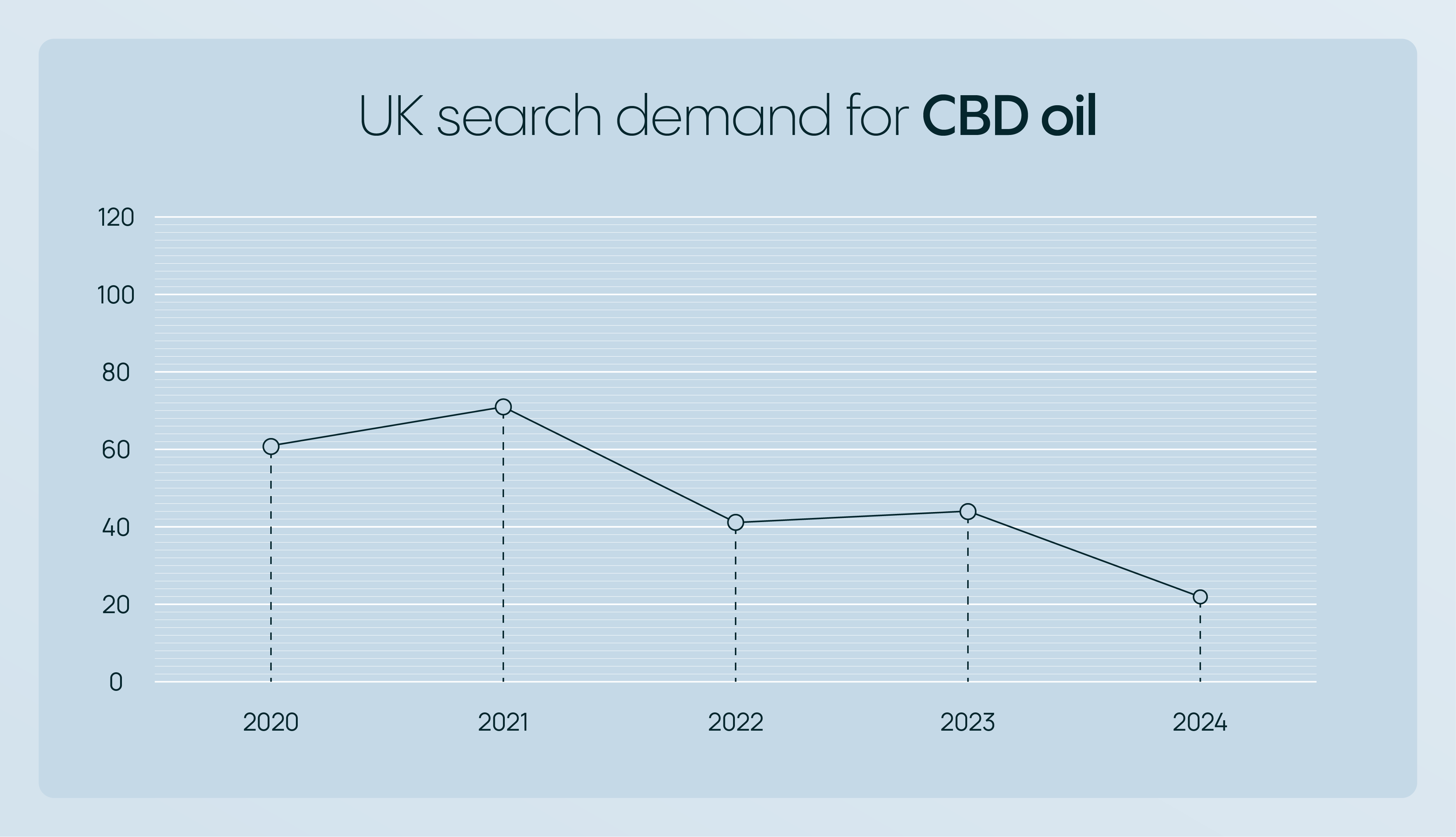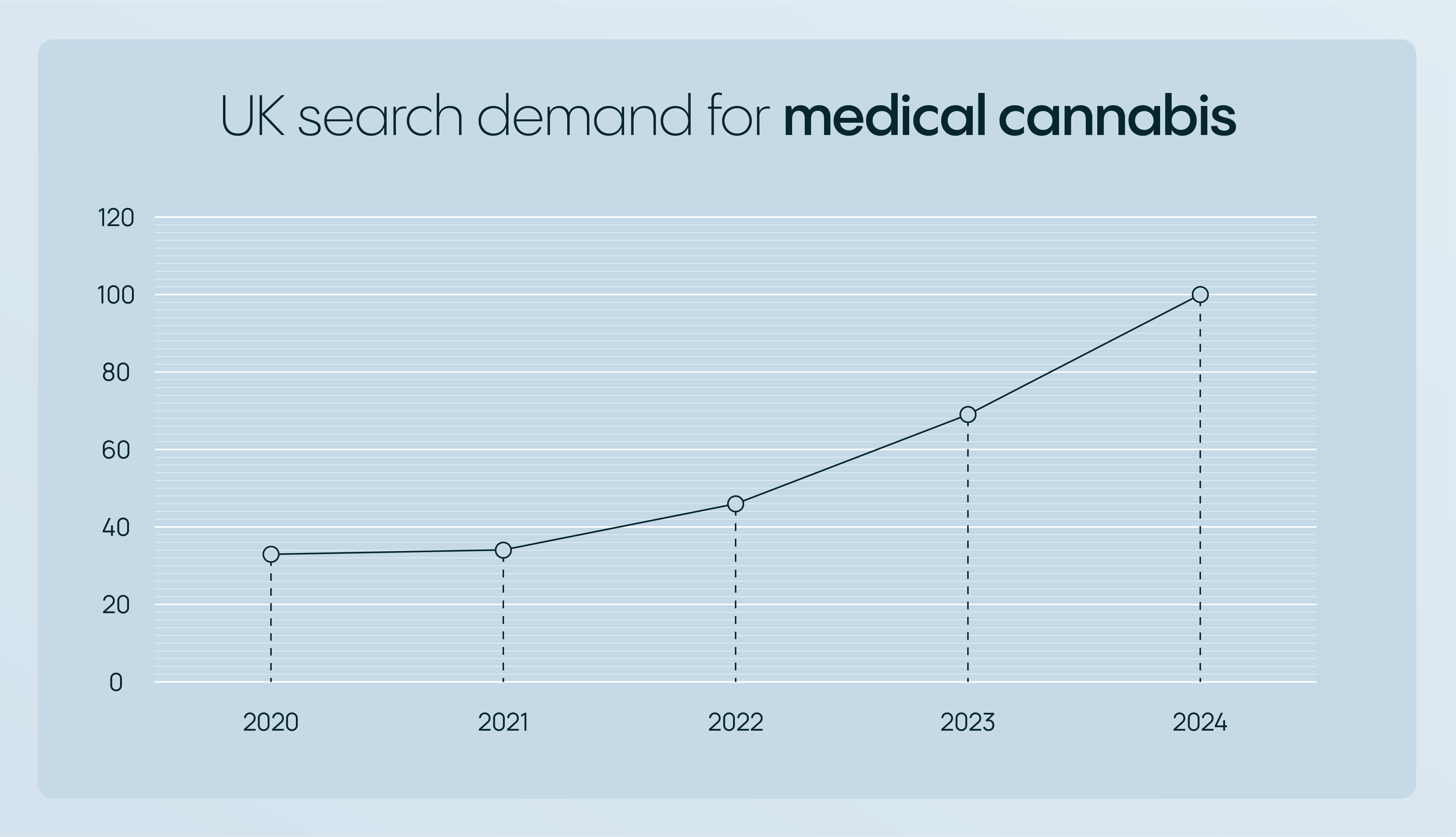A summary of the statistics: Perceptions and awareness of medical cannabis in the UK
10 min read
Lucy MacKinnon
In November 2018, medical cannabis and cannabis-derived medicines were legalised as prescription only medicines in the UK. This means they can now be prescribed by specialist doctors to patients who have a condition that is known to respond to cannabis, if they have been unable to find success with conventional or licensed approaches.
Contents
Since this law came into effect, a series of surveys and studies have been conducted to assess the awareness, understanding, and acceptance of these new options in the UK, and so, we’ve designed this blog to serve as a summary of their collective findings.
Here we analyse the data from seven different surveys published between November 2018 and April 2024, as well as insights from Google Trends and the NHS, to reveal how attitudes towards, and interests in, medical cannabis have shifted or evolved in the UK following its legalisation.
Awareness of medical cannabis in the UK
In 2022, a survey of over 10,000 UK-based adults found that 24% did not know medical cannabis could be legally prescribed in the UK, and of those who did know these options could be prescribed, 41% believed they would be too hard to access.
However, another survey conducted the same year with 4,000 participants found a much larger proportion of their cohort (59%) were unaware these cannabis-based options were legally available, and a further 84% were unaware this included medical cannabis flower.
Our own representative market research, conducted in April 2023, also found 59% of adults were unaware that medical cannabis had been legalised in the UK, with 35% believing it was not legal, and a further 24% admitting that they were unsure whether medical cannabis was legal or not.
Another, albeit small scale, survey of healthcare professionals in the UK discovered that 10% did not know unlicensed cannabis based medicines, such as medical cannabis flower, could be prescribed to eligible patients in the UK. These findings were published in January 2024, more than five years after the legalisation of medical cannabis.
Collectively, these findings illustrate that a significant proportion of the population (including a small proportion of healthcare providers) is still unaware that medical cannabis is an available and accessible option in the UK for those who are deemed eligible - highlighting a real need for further awareness.
Understanding of UK medical cannabis legislations
Another survey, published in April 2020, revealed other interesting findings about the lack of clarity on what is, and is not, permitted following the legalisation of medical cannabis
This survey, of 1,022 individuals in the UK, found only 19% of their cohort were aware it is illegal to source your own cannabis to self-medicate with, and that medical cannabis is only legal if it has been prescribed by a qualified doctor, and dispensed from a legal and legitimate pharmacy.
But, 20% thought that self-medicating with cannabis you have sourced yourself was legally permitted in the UK (it is not), and 42% admitted they did not know.
Their survey also found there was confusion surrounding who could, and could not, prescribe cannabis-based treatments in the UK, with 42% believing any doctor could prescribe these options, and 54% believing only specialists could prescribe medical cannabis to patients with the condition they specialise in.
While these findings are now four years old, there is still a need for clarity surrounding medical cannabis applications. For example, just last year, our survey discovered that knowledge of which conditions cannabis-based medicines can be prescribed to treat, also largely varies.
For example, 46% of our survey cohort knew medical cannabis was a suitable treatment option for some patients with chronic pain, but, on the other hand, only 4% knew patients with gut health disorders like IBS may also be able to benefit from these options.
Acceptane of cannabis-based medicines in the UK
Despite the large discrepancies in the populations' awareness of the legality surrounding medical cannabis in the UK, studies have repeatedly shown an overwhelming majority would consider using these options to manage their health condition - especially if their doctor had recommended them.
Mamedica’s survey, released in 2022, found 89% of those they surveyed would be interested in trying medical cannabis if it was prescribed to them by their doctor, and our own survey found similar findings.
We discovered over 40 million, or 68% of UK adults, would consider trying medical cannabis as a treatment for their health condition if their doctor had recommended it, again illustrating a clear acceptance for these options amongst the British public, so long as it comes with medical endorsement.
Our survey also found that 29.6 million adults in the UK have been diagnosed with a condition that is suitable for cannabis-based treatments. 46% of these describe living with significant distress and discomfort because of their health, which demonstrates just how many people could potentially benefit from these options in the UK.
You may also be asking - how many people are actively using cannabis-based medicines, or receiving prescriptions for medical cannabis in the UK? But unfortunately, this is not entirely clear.
While it's generally quoted that around 30,000 people are currently receiving prescriptions for medical cannabis in the UK, the real figure remains unknown as there are now over 30 prescribing private medical cannabis clinics in the UK.
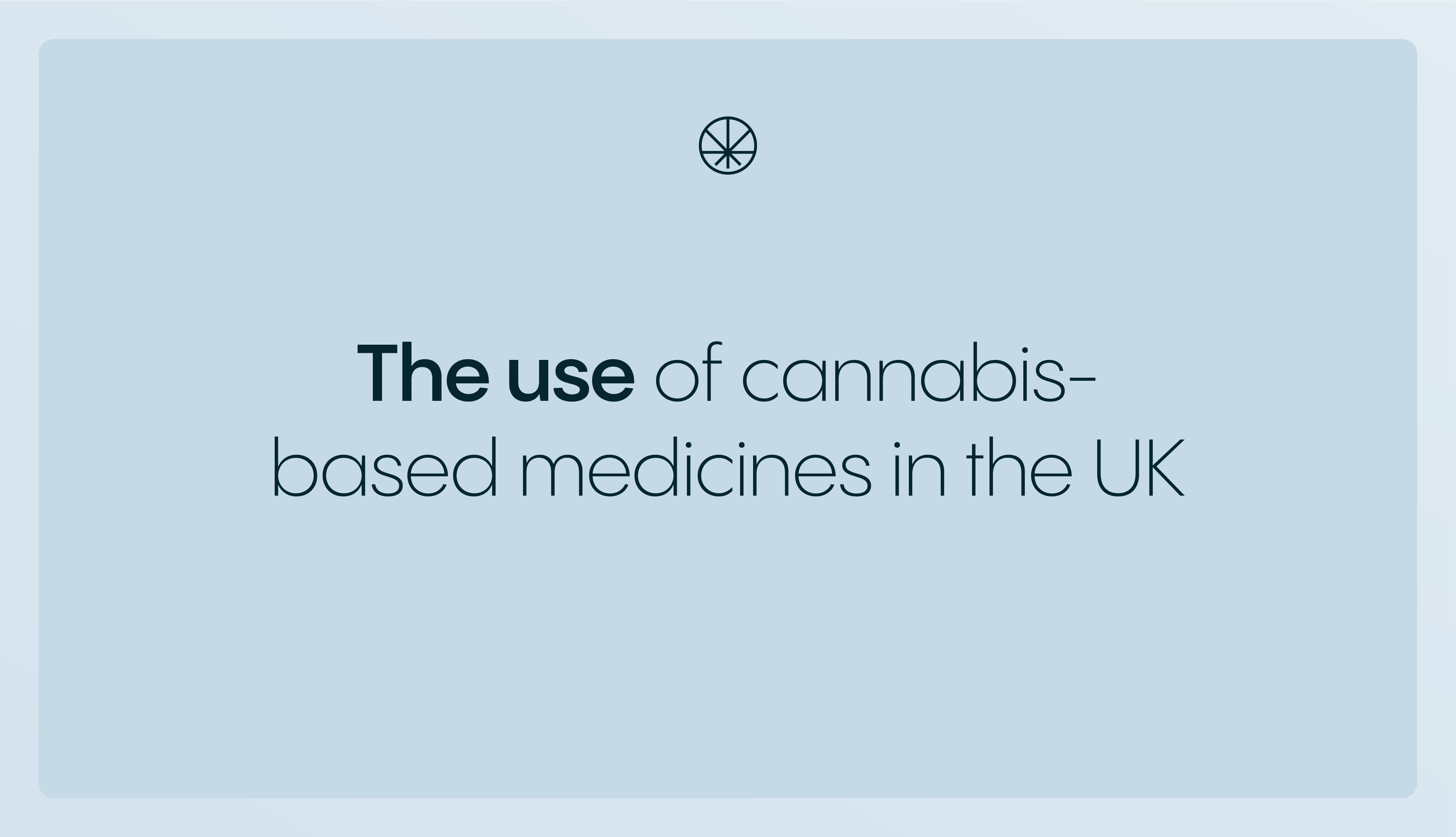
The use of cannabis-based medicines in the UK
According to Prohibition Partner’s first Cannabis Report, between the legalisation of medical cannabis in November 2018 and August 2019, 153 cannabis-based items were prescribed in the UK. However, it is unclear how many individual patients received these prescriptions.
In 2022, the NHS business services authority published further data that helps to track the growing acceptance and use of cannabis-based medicines in England, but this data also demonstrates the large disparity in prescriptions issued by the NHS and private healthcare providers.
According to their figures, between November 2018 and October 2022, the NHS prescribed 11,976 licensed cannabis-based medicines in England, however the number of prescriptions issued for unlicensed cannabis-based treatments has not been released.
It is said this is because the NHS have prescribed unlicensed cannabis-based medicines to fewer than five patients in England and releasing more information on this would be a breach of GDPR, as it could lead to a patient being identified.
In comparison, between November 2018 and July 2022, private healthcare clinics in England issued prescriptions for 89,239 unlicensed cannabis-based treatments to patients with eligible conditions. 140 prescriptions for licensed cannabis-based medicines were also issued by private healthcare providers in England between November 2018 and October 2022.
Healthcare provider’s attitudes towards medical cannabis
Another source worth looking at when evaluating perceptions of, and attitudes towards, medical cannabis in the UK, is the Primary Cannabis Care Networks (PCCN) survey of 1,005 General Practitioners working in the UK, which was released in 2021.
At the moment, GPs are allowed to provide follow-up care for patients on cannabis-based treatment plans, but only specialist doctors registered by the GMC can issue a patient’s first prescription for cannabis-based options.
The PCCN survey discovered 51% of the GP’s they interviewed supported the use of cannabis-based medicines for patients who have exhausted conventional or licensed treatment options for their condition.
27% also said they support the use of medical cannabis to improve quality of life, and 24% supported its use in multi-symptom management - however over a quarter (29%) said they felt cannabis has no medicinal or therapeutic benefits.
When asked about medical cannabis clinical trials, 42% said they would support trials that assessed the efficacy of cannabis-based medicines in the treatment of chronic cancer pain, for palliative care, and for intractable epilepsy.
1 in 4 said they would support trials into its efficacy in treating chronic non-cancer pain, and 1 in 5 said the same for Parkinson’s - but 26% said they would not support trials in any of these areas.
The results of this survey show how fragmented opinions of, attitudes towards, and support for medical cannabis is within the UK’s medical community.
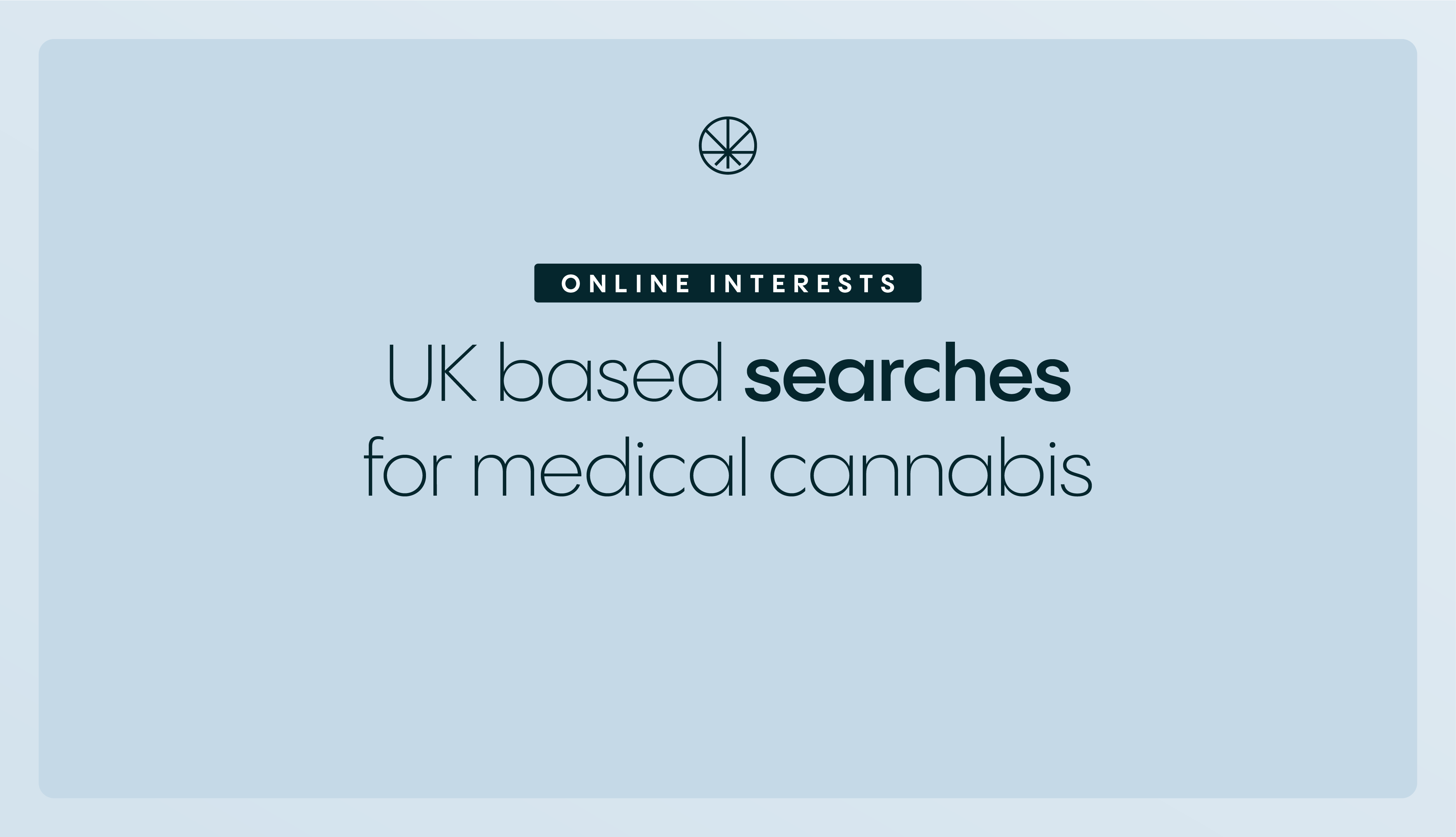
Online interests: UK based searches for medical cannabis
We also conducted our own research using data from Google Trends to find out what the UK was more curious about when it comes to medical cannabis, and analyse how internet searches for cannabis-related terms have shifted or changed over the years.
Using this data, it's clear to see that the demand for information about how to access medical cannabis has continued to grow post legalisation in the UK. For example, the search term ‘medical cannabis’ steadily increased in popularity between 2020 and 2023, but then spiked by 45% in 2024 - suggesting a sudden surge of interest.
According to these findings, the search term ‘medical cannabis’ reached its peak in April 2024 and was three times more popular than it was during the same month in 2021 and 2020.
UK based searches for medical cannabis
Click the graph to enlarge
Searches for cannabis prescriptions
Google Trends data also shows that between 2021 and 2022, google searches for ‘cannabis prescriptions’ rose in popularity by 32%, and then between April 2022 and April 2023 the search term increased in popularity again - this time by 116%.
Since then, this has continued to grow, and between 2023 and 2024, searches for 'cannabis prescriptions' increased in popularity yet again by 25% to reach its peak in April 2024.
This data clearly shows that since 2020, there has been a gradual increase in the demand for, and therefore seemingly an increase in the acceptance of, prescription cannabis in the UK.
UK based searches for 'cannabis prescriptions'
Click the graph to enlarge
Comparing searches for medical cannabis with those for CBD oil.
As we previously mentioned, over the last five years, searches for ‘medical cannabis’ have consistently increased in popularity to reach their peak in April 2024. This suggests the UK has a growing interest or demand for information into the legality, or availability, of medical cannabis.
However, in comparison, demand, or interest in CBD oil appears to have fallen. In April 2020, the search demand for CBD oil was relatively high and scored at 61 out of 100 for its popularity ranking, but by 2024, this had fallen to 22.
This data suggests that while people in the UK are still seeking for information about both CBD oil and medical cannabis, the overall interest in CBD oil has decreased, while interest in medical cannabis has increased - which could indicate a shift in public interests.
UK search demand for CBD oil vs medical cannabis
Click the graph to enlarge
Click the graph to enlarge
Final thoughts
Despite its legalisation taking place over five years ago, this collection of findings displays how fragmented the UK’s understanding of medical cannabis is. While there has been a notable increase in public interest, and potentially acceptance, of cannabis derived treatments, there is still clear confusion surrounding its legality, and accessibility in the UK. This underscores a need for further awareness and education surrounding the therapeutic and medicinal applications of cannabis for both the public, and healthcare providers.
Share article
Did you like this article?
It is important to seek medical advice before starting any new treatments. The patient advisors at Releaf are available to provide expert advice and support. Alternatively, click here to book a consultation with one of our specialist doctors.
Elevate your wellness with medical cannabis
Get comprehensive care, convenience, and confidence with an all-in-one treatment plan.
Am I eligible?Authors
With five years of journalism and healthcare content creation under her belt, Lucy strives to improve medical cannabis awareness and access in the UK by producing high quality, credible content.
Editorial Policy
All of our articles are written by medical cannabis experts, guided by strict sourcing guidelines, and reference peer-reviewed studies and credible academic research. Our expert clinical team and compliance specialists provide valuable insights to ensure accuracy when required. Learn more in our editorial policy.
Need more help?










